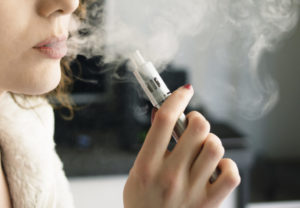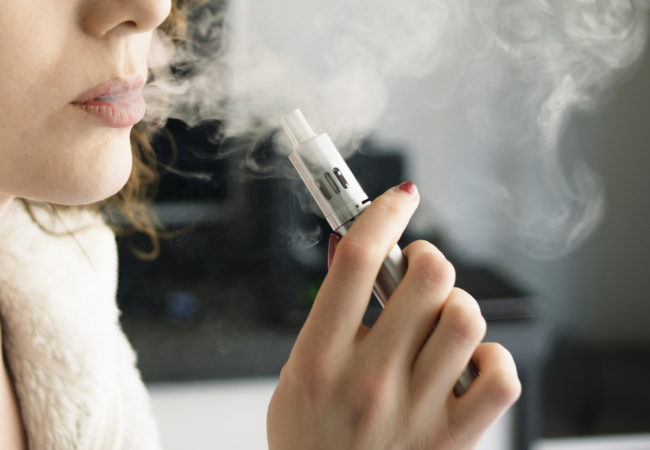
There’s a lot of controversy in today’s market surrounding the use of consumer vape products. Are they safe? Can they be fixed? Are they legal? We would love to report that those questions are commonly being discussed among industry insiders, but sadly those aren’t the discussion points that are being hashed out according to our sources. Here’s the reality – in our opinions, answering the above questions isn’t a priority for anybody who makes a living selling vape products.
Vaping was first introduced as a way for the nicotine addicted masses to break free from their shackles of dependency. IT WAS SUPPOSED TO BE A TEMPORARY TOOL TO HELP SMOKERS QUIT SMOKING. It was never intended to become its own lifelong set of leg irons, let alone a death sentence. Given all of the sickness and tragedy in recent months, we the public are left standing on the sidelines, watching manufacturers prepare for battle with federal regulators and state governments as an army of lobbyists scurry around in circles. All of this while we’re left wondering, “Is it safe? Can it be fixed? Is it legal?”
We feel obligated to clarify that neither our companies, nor we ourselves individually, endorse any vape products or derive any revenue from vape products. The Harvest Wholesalers Policy Statement is simple:
“There is a staggering lack of any quality research that quantifies the long-term effects and potential health risks of these vape based products. Harvest Wholesalers, LLC (and its subsidiary FarmersMarketWellness.com) therefore, can NOT conclude that vaping is safe, and will NOT engage in business practices that promote, endorse, or generate revenue from the vape category.”
That said, let’s address the question at hand. What should patients and consumers who feel that they need these products, do to protect themselves?
Understand the Differences
The majority of vape products on the market fall into one of three categories in terms of contents – nicotine vapes (e-cigs), CBD vapes (from industrial hemp), and THC vapes (from marijuana).
Some researchers say that nicotine based vape products are better for you than smoking cigarettes while others genuinely believe those products are equally as bad, if not worse. Regardless of which group is correct, nicotine is a poison. Don’t smoke cigarettes. Don’t vape nicotine.
THC is the molecule in the Cannabis Sativa plant that has psychoactive effects and gets users “high”. With regard to vape products that contain more than trace amounts (0.3% by volume) of THC, users fall into two main groups – medical users who need the benefits of the medicinal properties of THC for specific ailments, and recreational users. Medical users obtain their vape products from state licensed dispensaries with the advice of (and a prescription from) their individual physicians. These vape users should ALWAYS follow the instructions from their doctors. If you are a recreational user who enjoys the feeling derived from THC (in states where recreational use is legal), you should employ alternative THC delivery systems that don’t come with the built-in risk factor of potentially damaging the only set of lungs that God gave you.
The remainder of this article will speak directly to the use of CBD vape products. In a very general sense, when possible, we urge people who need CBD therapeutics to utilize an alternative CBD delivery system. From topicals and oil tinctures, to capsules, or even CBD infused edibles and beverages, there are a myriad of options available to get the CBD you need into your system. Why then would anyone choose a product with so much inherent risk? The answer is the speed of bioavailability.
When comparing CBD vape products to other CBD delivery systems in terms of how quickly the CBD reaches the user’s bloodstream, vaping wins the race every time. Vaping CBD allows the effects to be felt by the user in as little as 2 – 6 minutes. The next closest efficacy time would be realized by properly using a sublingual oil tincture which will typically take 20+ minutes before the effects can be felt. If not for this 15 to 20-minute delta in the efficacy time between vape products and tinctures, we at Harvest Wholesalers, LLC and FarmersMarketWellness.com would absolutely say that nobody should vape anything, for any reason, at any time.
We can’t however, in good conscious say that. We recognize that in certain specific circumstances, the speed of delivery is crucial to the user achieving their intended result. Some of the earliest advocates of CBD use for therapeutic purposes were people who suffer from severe anxiety disorders or who suffer from acute, intense pain. When you’re pain level is literally off the charts (of the standard 1-10 pain scale), the difference between 4 minutes and 22 minutes can feel like a millennium. Likewise, since a lot of people who experience intense anxiety can feel those attacks starting, delivery time is paramount in being able to seek relief that has a chance of mitigating the severity of the attack. In those two specific examples, speed of efficacy matters, and it matters a lot.
While it would contradict our core beliefs and our operating principles to represent vape products because of the potential dangers to the end consumer, we won’t bury our heads in the sand and pretend that there aren’t a few people who have a genuine need for vape. We think these people deserve access to any opinions we can render that may help them find products that are ultimately safer than other products.
How to be as safe as possible.
If you absolutely must have a CBD vape product, there are some specific things to consider so that you place yourself at as little risk as possible. The three big things to consider are QR codes, manufacturer’s reputations, and carrier oils.
QR Codes
If a reputable company is putting out quality products, the company never minds when someone takes a close look. In fact, most of the manufacturers we represent actually welcome the scrutiny because they constantly strive to improve their products, improve their processes, and improve their customer responsiveness. With regard to CBD products in general, reputable manufacturers will have a QR code on their packaging that leads the consumer to lab results posted by independent, third-party testing facilities. Question any vape product you see that doesn’t have a QR code, and question any QR code that leads to lab results posted on the manufacturer’s domain as opposed to the laboratory’s domain.
Manufacturer’s Reputations
Admittedly, this one is a little tricky. We absolutely encourage you to read online reviews, articles, and ratings. Keep in mind though that in the information age of affiliate marketing, a significant portion of what you’re reading, may in fact be biased.
Since Harvest Wholesalers, LLC does not rep for (or sell) any vape products, we have not independently tested any vape products the way we do with the products we represent. What we can say is that a lot of the manufacturers whose products we do represent, also produce vapes. In that respect, we know these manufacturers to be reputable, honest, and genuinely driven by a desire to help people in need. The manufacturers who are listed on HarvestWholesalers.com or FarmersMarketWellness.com are likely to produce some of the safest vape products available.
Carrier Oils
In most cases, CBD vape cartridges contain CBD housed in an oil commonly referred to as a carrier oil. Different carrier oils are generally chosen to act as a thinning agent so the plant-based material is more easily converted into a vapor when heated. We’ve seen vape products on the market using hemp seed oil, olive oil, canola oil, and MCT oil among others. Additional thinning agents like Propylene Glycol (PG or PPG), and Polyethylene Glycol (PEG) 400 are also frequently added to vape cartridges. In our opinion, vapes with PG or PPG or PEG 400 should be avoided if possible due to unnecessary risks to your bronchial tubes, and smaller airways.
One of the most popular carrier oils currently is MCT or medium chain triglyceride oil (think extra virgin coconut oil). A lot of manufacturers favor this oil because when ingested, MCT oil does provide certain health benefits. It’s crucial to remember though that just because something is healthy when eaten, doesn’t necessarily mean that its healthy when heated and inhaled. In the case of MCT oil, it gives off significantly less carcinogens than other thinning agents, but overuse or setting the vaporizer to too high of a temperature can result in a condition called lipid pneumonia, which is the result of an oil build up in the lungs. There are also studies suggesting that when heated above a certain temperature MCT oil transforms into formaldehyde gas.
It really doesn’t matter which angle you explore the issue from. The fact is that vaping in any form or fashion, (even if you desperately need the medication as quickly as possible), is dangerous and potentially harmful. As our company policy states, “There is a staggering lack of any quality research that quantifies the long-term effects and potential health risks of these vape based products.” Policy aside, each of us knows that the idea that drawing anything into our lungs (aside from air) is “safe,” is counterintuitive to believe. It is for this reason that we encourage everyone reading this article to please avoid utilizing vape products if at all possible. If using a vape is something that you absolutely have to do, be as thorough as you can with your research. We recommend you follow the steps we’ve outlined above, and mitigate your risk to the greatest extent possible. As part of our Farmers Market Wellness family, you’re important to us. You and your health matter.
